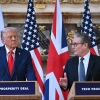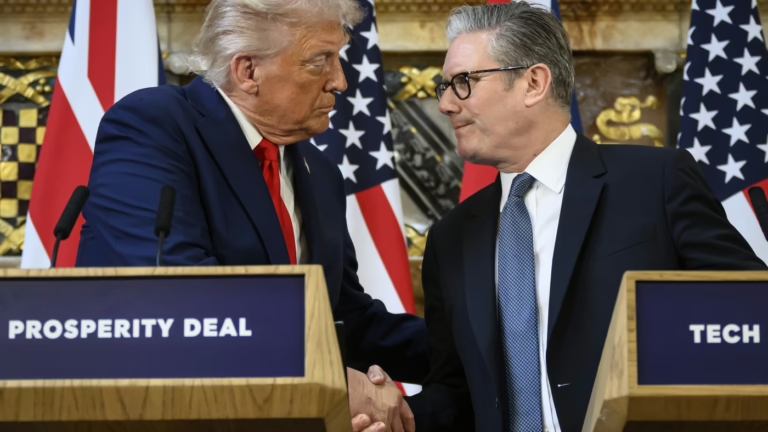U.S. President Donald Trump (left) and British Prime Minister Keir Starmer shake hands during a press conference at Chequers near Aylesbury, England, on Thursday, September 18, 2025, marking the end of President Trump’s second state visit to the UK.
Leon Neal/Pool Getty/AP
hide caption
toggle caption
Leon Neal/Pool Getty/AP
In a significant diplomatic development, the United Kingdom is poised to officially acknowledge a Palestinian state this Sunday, despite strong objections from the United States. This decision follows the UK’s assessment that Israel has failed to fulfill the conditions it previously set regarding the ongoing Gaza conflict.
While largely symbolic, this recognition aims to amplify international diplomatic efforts to halt the violence in Gaza and foster a foundation for enduring peace in the region.

Deputy Prime Minister David Lammy, who recently stepped down as foreign secretary, confirmed that Prime Minister Keir Starmer will announce the recognition of Palestine later on Sunday.
“Recognizing a Palestinian state does not instantly create one,” Lammy told Sky News, emphasizing that the move is a step toward keeping the two-state solution viable and clarifying that Palestinians should not be conflated with Hamas.
Earlier this year, under mounting pressure from within his Labour Party, Starmer declared that the UK would proceed with recognition unless Israel agreed to a ceasefire in Gaza, permitted humanitarian aid through the United Nations, and took concrete steps toward a sustainable peace agreement.
This announcement precedes the upcoming United Nations General Assembly, where countries such as Australia, Canada, and France are also preparing to recognize Palestine.
The UK’s decision follows closely on the heels of U.S. President Donald Trump’s recent state visit, during which he openly opposed the recognition plan.
“I disagree with the prime minister on this matter,” Trump remarked. “It’s one of the few points where we don’t see eye to eye.”
Opponents, including the U.S. and Israeli governments-both skeptical of a two-state solution-have criticized the move, arguing it rewards Hamas and legitimizes terrorism.
Starmer has been clear that Hamas will not participate in governing the Palestinian people and has demanded the release of Israeli hostages taken during the October 7, 2023 attacks.

Over 140 nations have already extended recognition to Palestine, but the UK and France’s decisions carry particular weight due to their status as permanent members of the UN Security Council and the Group of Seven.

Palestinians displaced from northern Gaza Strip evacuate on foot and by vehicle, carrying their possessions along the coastal road near Wadi Gaza on Saturday, September 20, 2025.
Abdel Kareem Hana/AP
hide caption
toggle caption
Abdel Kareem Hana/AP
Both Britain and France have played pivotal roles in shaping Middle Eastern geopolitics over the last century, tracing back to the post-World War I division of Ottoman territories.
During this period, the UK administered the territory known as Palestine and issued the 1917 Balfour Declaration, which supported establishing a “national home for the Jewish people.”
However, the declaration also emphasized that “nothing shall be done which may prejudice the civil and religious rights” of the Palestinian inhabitants-a commitment that has often been overlooked.
David Lammy, who will represent the UK at the upcoming UN session, described this neglect as “a historical injustice that continues to unfold.”
For decades, the UK has advocated for a sovereign Palestinian state coexisting alongside Israel, but has maintained that formal recognition should be part of a broader peace framework aimed at a two-state resolution.
Nonetheless, UK officials are increasingly concerned that such a resolution is slipping out of reach, not only due to the devastation and displacement caused by nearly two years of conflict in Gaza but also because of Israel’s ongoing expansion of settlements in the West Bank-territory Palestinians claim for their future state. The international community widely regards Israel’s occupation of the West Bank as illegal under international law.

















